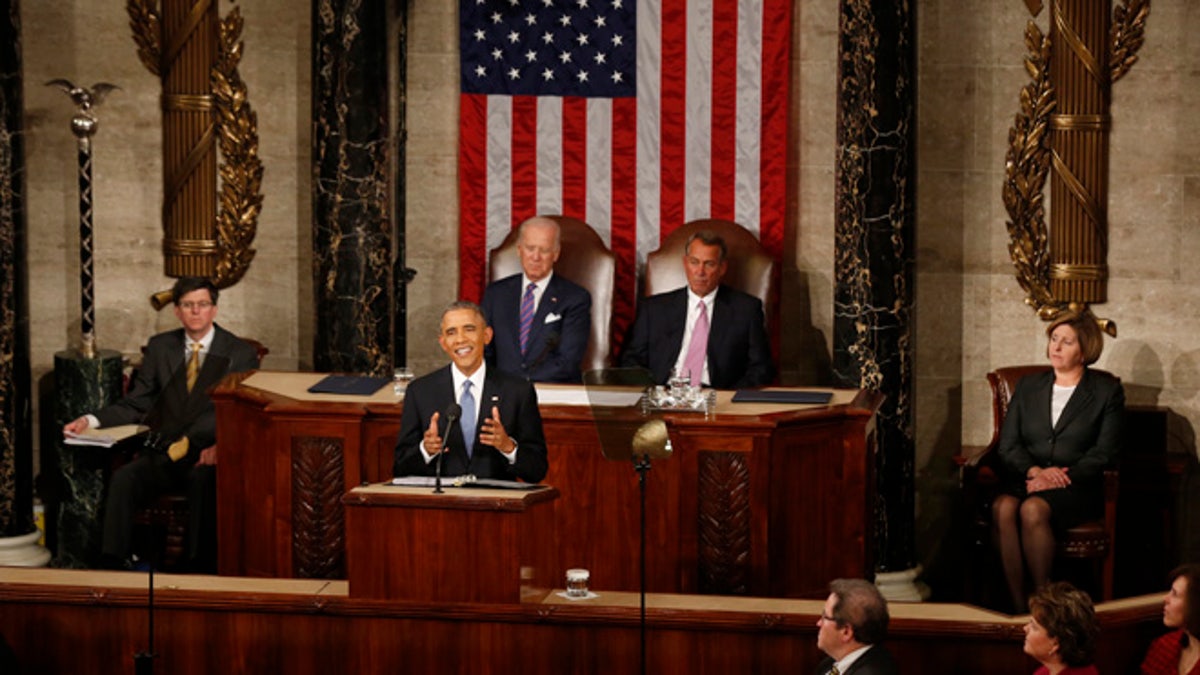
January 20, 2015: U.S. President Barack Obama delivers his State of the Union address to a joint session of the U.S. Congress on Capitol Hill in Washington. (REUTERS/Larry Downing)
Many American voters are not on the same page as President Obama when it comes to the mood of the country and his economic proposals. Yet significant improvements in perceptions of the economy are boosting approval of the president -- and less than half of voters want his executive actions repealed.
First, Americans don’t think we’re the happy family President Obama described in his State of the Union speech. A new Fox News national poll released Wednesday finds that by a three-to-one margin, voters see America as a dysfunctional family rather than as the “tight-knit” grouping Obama claimed we are (73-24 percent).
Click here for full results of the poll (pdf)
Men, women and voters of all age groups endorse the dysfunctional description, and even a majority of Democrats -- 61 percent -- agrees. Still, Democrats are more than twice as likely as Republicans to call America a tight-knit family (37 vs. 14 percent).
Voters also sharply disagree with the president’s strategy of taking government actions to help improve economic conditions specifically for the middle class. By a 26-point margin, they think government policies should help improve the economy for everyone (61 percent) rather than target actions just for the middle class (35 percent). Even voters describing themselves as middle class think the focus should be on improving the economy overall (59 percent) rather than just for the middle class (37 percent).
When it comes to helping everyone versus the idea of “spreading the wealth,” voters are more evenly divided. Forty-six percent think it is a good idea and 45 percent a bad idea to use some of the money government collects in taxes to “spread the wealth” to others who are less well off. That’s unchanged since 2008 when it was also 46 percent good idea vs. 45 percent bad.
Perhaps predictably, that view breaks down along income-related lines. Voters in households earning less than $50,000 like the idea of spreading the wealth (by a 12-point margin), while those earning $50,000 or more don’t like it (by a 9-point margin). Those voters describing themselves as middle class are more evenly divided: 45 percent call it a good idea and 47 percent say bad idea.
Roughly two-thirds of Democrats think spreading the wealth is a good idea (69 percent), while two-thirds of Republicans say the opposite (68 percent).
There’s more agreement that things are improving, as 53 percent of voters think the economy is getting better. That’s up 10 percentage points from 43 percent in September -- and marks a new high during Obama’s presidency. The previous high was 49 percent recorded in both October 2012 and May 2010. Still, for 36 percent of voters it feels like economic conditions are getting worse.
Those living in higher-income households (58 percent) are more likely than those in lower-earning households (48 percent) to say the economy is getting better. In addition, voters under age 45 (59 percent) are more likely than those ages 45 and over (48 percent) to feel things are improving.
Democrats (72 percent) are more than twice as likely as Republicans (35 percent) to say things are looking up on the economy.
Despite a record-high number saying the economy is improving, only 19 percent say they are better off financially now than when Obama took office. Some 28 percent feel they are worse off, while a slim 52-percent majority says their family’s financial situation is about the same.
Sunnier perceptions of the economy have helped Obama’s job rating: 45 percent of voters approve of how he is doing, while 51 percent disapprove. While his rating is still in negative territory, this is the first time since October 2013 that approval of the president’s performance has been this high. Last month, 42 percent approved and 53 percent disapproved.
The increase in approval of Obama comes mainly from independents: 45 percent approve now, compared to just three in 10 in early January (31 percent) and December (30 percent).
And Congress also gets its best ratings in more than a year, although that’s not saying a lot: 18 percent approve, while 73 percent disapprove. The last time approval of Congress was this high was July 2013. In December, 14 percent approved of Congress and 80 percent disapproved.
Now that Republicans control Congress, some wonder if GOP lawmakers will try to cancel or repeal the unilateral actions Obama has taken through executive orders. Voters have mixed views: 45 percent want Congress to repeal Obama’s unilateral actions, yet 39 percent disagree.
Political identification plays a big role in that assessment: most Republicans want Obama’s executive orders repealed (by 71-17 percent), while Democrats oppose that idea (60-23 percent). Independents split: 40 percent for repeal and 40 percent against.
Pollpourri
Voters resoundingly reject Obama’s proposal to start taxing so-called 529 college savings accounts: fully 82 percent call that a bad idea, including 80 percent of Democrats. The disapproval climbs to an overwhelming 88 percent among parents. The White House announced late Tuesday it will withdraw plans to tax these accounts.
More than four in 10 American voters describe themselves as middle class (43 percent), and another 13 percent say they are “upper” middle class. Even 38 percent of those with household annual income over $100,000 consider themselves middle class.
Just 15 percent of voters think the country is safer than when Barack Obama became president. More than twice as many -- 34 percent -- feel the country is less safe now. The largest number -- 50 percent -- say things are the same.
The Fox News poll is based on landline and cell phone interviews with 1,009 randomly chosen registered voters nationwide and was conducted under the joint direction of Anderson Robbins Research (D) and Shaw & Company Research (R) from January 25-27, 2015. The full poll has a margin of sampling error of plus or minus three percentage points.




